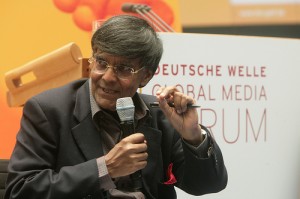Media’s role in communicating sustainable development
 At this year’s Deutsche Welle Global Media Forum, which took place from June 20-22 in Bonn, Germany, sustainable development expert Mohan Munasinghe recommended that the media help spread the word to the world’s elite that it’s in their own interest to limit consumption and allow the poor to grow out of their poverty. In terms of resources, the “more the rich consume, the less there is for the poor,” he said. Otherwise the entire global system is at risk of collapse with unforeseen consequences for everyone.
At this year’s Deutsche Welle Global Media Forum, which took place from June 20-22 in Bonn, Germany, sustainable development expert Mohan Munasinghe recommended that the media help spread the word to the world’s elite that it’s in their own interest to limit consumption and allow the poor to grow out of their poverty. In terms of resources, the “more the rich consume, the less there is for the poor,” he said. Otherwise the entire global system is at risk of collapse with unforeseen consequences for everyone.
As vice chair of the Intergovernmental Panel on Climate Change, Mohan Munasinghe shared the Nobel Peace Prize with Al Gore in 2007. Currently he is chairman of the Munasinghe Institute for Development (MIND) in Colombo, a professor of sustainable development at the University of Manchester in the U.K., a distinguished guest professor at Peking University and honorary senior adviser to the government of Sri Lanka. He is widely recognized as having introduced a framework called sustainomics to make development more sustainable.
Munasinghe said that the driving forces of globalization have converged in such a way that now the world’s richest 20% consume 85% of resources. Noting some cities, communities and big businesses around the world that have already voluntarily committed to more sustainable paths, more such activity could increase “bottom-up pressure” and also encourage governments and international institutions to go forward with more sustainable policies.
Earlier this year, Munasinghe proposed to the United Nations the Millennium Consumption Goals, a complement to the Millennium Development Goals to help the world’s poor. Unlike the MDGs, the MCGs would be voluntary.
Though there are upsides to globalization for some, Munasinghe currently sees a “systematic crowding-out” of the world’s poor, not only in terms of their economic prosperity, but also their environmental welfare and social inclusion. Speaking during a plenary discussion on globally active corporations and human rights, Munasinghe said, “Sustainable development, which provides basic needs like food, water and energy and ensures survival and a decent standard of living, is a fundamental human right”.
In an interview, Munasinghe explained his view of the media’s role in sustainable development. He says the media play a critical role in communicating to the rich their responsibility to bring about change and that there is much at stake – not only for the poor but for the elite as well – if the current global system collapses. They would only need to make small changes with no great impact on their lifestyles by reducing consumption by about 10% – 15%. This would create more resources for the poor and allow for “managed change” which is much more preferable to unpredictable change.




Feedback